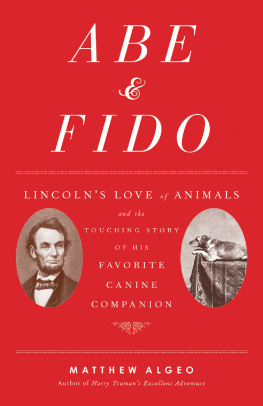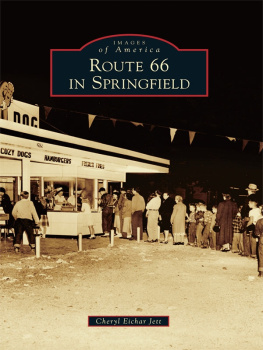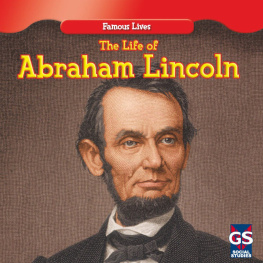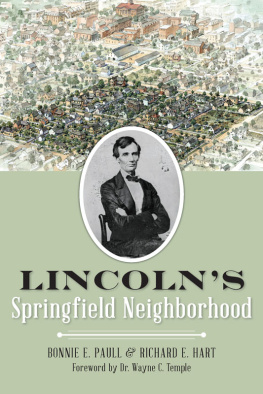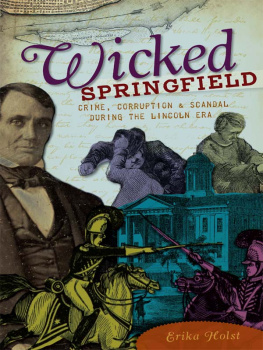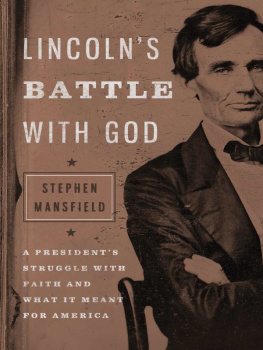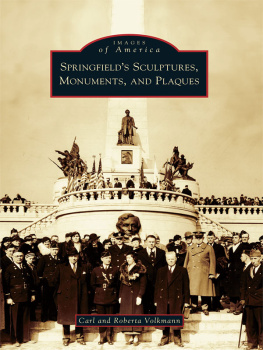IN EARLY 1861 , as he prepared to leave his home in Springfield, Illinois, to move into the White House, Abraham Lincoln faced many momentous tasks, but none he dreaded more than telling his two youngest sons, Willie and Tad, that the familys beloved pet dog, Fido, would not be accompanying them to Washington. Lincoln was afraid the skittish dog couldnt endure the long rail journey, so he decided to leave the mutt behind with friends in Springfield.
Fido had been by Lincolns side as the prairie lawyer rose from obscurity to the presidency, sometimes carrying bundles of letters from the post office in his mouth as he and his master walked the streets of the state capital. Abe & Fido tells the story of two friends, an unlikely tandem who each became famous and died prematurely.
The book also explores the everyday life of Springfield in the years leading up to the Civil War, as well as Lincolns sometimes radical views on animal welfare and how they shaped his life and his presidency. Its the story of a master and his dog, living through historic, tumultuous times.
Copyright 2015 by Matthew Algeo
All rights reserved
Published by Chicago Review Press, Incorporated
814 North Franklin Street
Chicago, Illinois 60610
ISBN 978-1-55652-222-2
Library of Congress Cataloging-in-Publication Data
Algeo, Matthew.
Abe & Fido : Lincolns love of animals and the touching story of his favorite canine companion / Matthew Algeo.
pages cm
Includes bibliographical references and index.
ISBN 978-1-55652-222-2
1. Lincoln, Abraham, 18091865. 2. Fido (Dog), 18551866. 3. Presidents petsUnited StatesHistory19th century. 4. DogsUnited StatesBiography. 5. Human-animal relationshipsUnited StatesHistory19th century. I. Title. II. Title: Abe and Fido.
E457.25.A44 2015
973.7092dc23
2014047591
Interior design: Jonathan Hahn
Printed in the United States of America
5 4 3 2 1
T O F RANK AND G IGI
Near this Spot
are deposited the Remains of one
who possessed Beauty without Vanity,
Strength without Insolence,
Courage without Ferocity,
and all the virtues of Man without his Vices.
L ORD B YRON, Epitaph to a Dog
CONTENTS







INDEX
PREFACE

The interval between Abraham Lincolns election in November 1860 and his inauguration the following March brought, in his words, multifarious demands upon my time and attention. This was to be expected; after all, the country was falling apart. In late December, South Carolina seceded, and by the end of January 1861 five more states would follow the Palmetto State out of the Union. Meanwhile, Lincolns efforts to assemble a cabinethis famous team of rivalswere foundering; he found it nearly impossible to placate the innumerable competing political and sectional factions, leaving him to grumble that really great men were scarcer than they used to be.
Lincoln spent much of this time in his hometown of Springfield, Illinois, holed up in a small room in the dry goods store owned by his brother-in-law, Clark M. Smith. The room was furnished with nothing but a simple desk and a chair. Here Lincoln struggled to compose his inaugural address while doing his best to avoid the hordes of office seekers who had descended on Springfield like a plague of winter locusts, beseeching the president-elect for everything from lowly postmasterships to plum diplomatic posts.
Yet, of all the weighty tasks facing Lincoln as he prepared to take the reins of a nation tearing itself apart, perhaps none weighed more heavily on his mind, none did he dread more, than delivering the heartbreaking news to his two youngest boys, Willie and Tad, that the familys beloved dog Fido would not be accompanying them to Washington. Lincoln felt the long rail journey would be too stressful for the skittish dog; it would be better to leave him behind with friends in Springfield.
When Lincoln finally broke the news to the boys, they were devastated. Surely there were tears. The boysin January 1861 Willie was ten and Tad sevenprotested that they could care for the dog on the trip and in Washington too. Lincoln was an indulgent parenthe believed children should be free, happy, and unrestrained by parental tyrannybut in this instance he stood firm: Fido must stay. It mustve taken all his considerable powers of statesmanship to convince the boys of the soundness of his decision. After all, they had practically grown up with the friendly yellow mutt. Eventually, reluctantly, the boys agreed.
That Abraham Lincoln put the welfare of Fido above his childrens tearful pleadings is indicative of just how much he cared for the dogand for all animals.
Animals had always played a central role in Abraham Lincolns life. As a young man, the kindness he showed them was practically unique on the frontier. At a time when pulling the heads off live geese was considered a perfectly reasonable way to pass the time, Lincoln preached that all living creatures were deserving of tender mercyeven ants. He thought nothing of rescuing animals in distress: a pig stuck in mud, orphaned kittens, even hatchlings separated from their mother. He owned pets throughout his lifeyaller dogs like Fido were a particular favoriteand as president he often found solace in the company of animals. His White House was a veritable menagerie, with a dog, cats, rabbits, goats, and ponies.
Yet the role that animals played in Lincolns life has been largely overlooked by his biographers, who often relegate his encounters with animals to mawkish sidebars. Maybe thats not surprising, considering the momentousness of his lifes accomplishments. Still, it is an aspect of Lincolns personality that demands further inspection; indeed, it may be the one area of his life not fully examined.
Through the presidents relationship with his beloved Fido, this book will tell the larger story of Abraham Lincolns attitude toward animals in general, an attitude that animated his life and even his presidency. As the Lincoln biographer Michael Burlingame has written, Lincolns outrage at the mistreatment of animals foreshadowed his indignation at the cruelties of slavery.
By his association with Lincoln, Fido became the most famous dog in America. His image was reproduced on a carte de visite, a kind of nineteenth-century trading card, which became a popular souvenir after Lincolns death. Fidos name was so famous that it practically became a synonym for the family dogand still is.
I hope this book will shed at least a glimmer of new light on Abraham Lincoln, Americas most analyzed president. Mostly, though, this tale is the simple story of a man and his dog. Both were famous, beloved, and, as we shall see, ultimately tragic figures.
Next page
